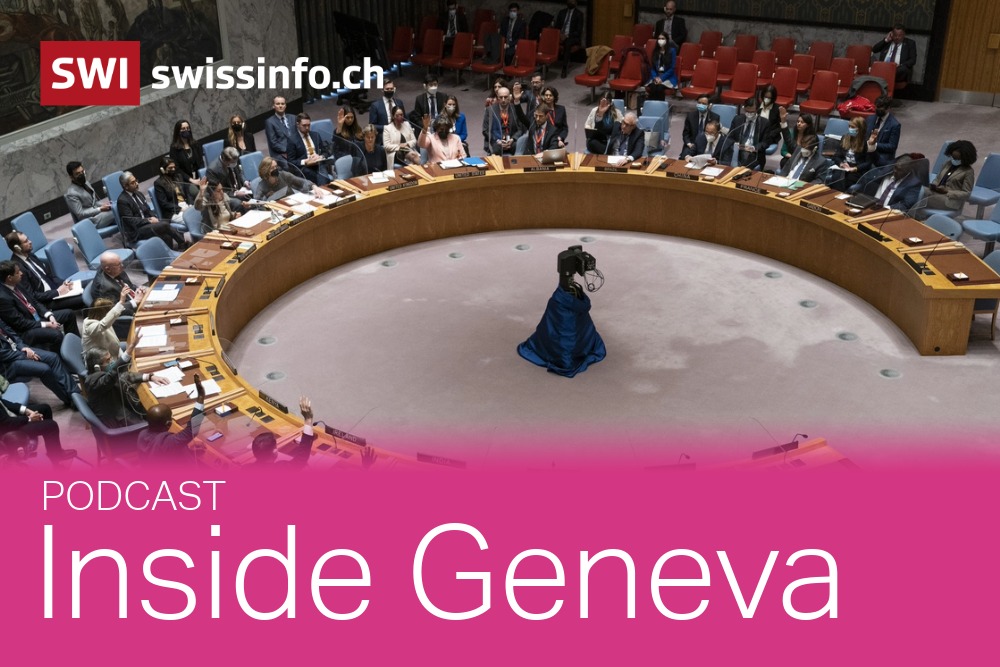
China and the US are dining and dashing at the UN: it’s time to stop them
For years, China and the United States have been quietly reaping the benefits of their status at the United Nations. The rest of the world needs a strong, responsive UN, and it must get everyone to fork up the cash, says Phil Lynch, Executive Director of the International Service for Human Rights (ISHR).
Imagine running a restaurant where two “clients” routinely show up to eat your food, leaving nothing for other patrons, then refuse to pay, and threaten to shut you down the second you protest.
For anyone working at or with the United Nations, this will likely sound like a familiar story. Our global restaurant is the UN, and the two bullying customers are the United States and China.
Between them, they owe the UN over $1.5 billion (CHF1.2 billion) in regular budget contributions and over $3.2 billionExternal link for peacekeeping operations. As a new ISHR report revealsExternal link, together with Israel and Russia, they are also the states which most often seek to wield their influence to defund UN human rights mechanisms by hijacking proceedings at the technical bodies tasked with calculating and allocating the organisation’s budget.
The UN is facing a financial crisis, which has primarily arisen because a number of states – though principally the US and China – are happy with the benefits of their membership, including by exercising their Security Council veto powers to shield themselves and their allies from critical scrutiny, while refusing to pay their fair share.
They do this by withholding their allotted contributions, in whole or in part, or by paying them too late to be expended by the UN – which is obligated to return unused funds to states if these could not be used within a calendar year.
Learn more about the trials and tribulations of the multilateral system in our Geneva podcast:

More
Inside Geneva: taking the pulse of the UN at 80
This is forcing the UN to make widespread cuts, slashing work to promote human rights, peace and development. The UN human rights system, already the organisation’s most chronically under resourced area of work, looks likely to be the hardest hitExternal link.
Imperfect though the UN may be, these crippling cuts could not come at a worse time.
The world has never had a more urgent need for effective multilateral cooperation to tackle global challenges, from the climate emergency to the impacts of artificial intelligence and conflicts across the globe. Nor has there ever been such a strong grassroots demand for a credible and accessible system of international justice: activists, victims and survivors of gross human rights violations from all regions continue to turn to the UN in unprecedented numbersExternal link to seek accountability, solidarity and protection denied to them at home.
Slashing funds for human rights at the UN inflicts very real human costs at the national level. A series of cuts proposed last September amount to more than 15% of the UN’s already meagre human rights budget. Just 1% of that budget is sufficient to fund the work of four of the UN’s independent human rights experts for a year.
Read more on the financial crisis at the UN, which is having big consequences on its Geneva operations:

More
UN activities in Geneva hampered by financial constraints
Over the last decade, those experts have contributed substantially to significant human rights progress in countries from all regions. Their work influenced and provided authoritative support in initiatives from the decriminalisation of abortion in Argentina, to safer access to water and sanitation in Mongolia, or the release of arbitrarily detained human rights defenders and journalists in Bangladesh, Burundi, Egypt, Guatemala, Saudi Arabia, Tanzania, and many more.
The cuts that have already been implemented have significantly reduced the capacity of UN Human Rights Council-mandated mechanisms to investigate violations in the Democratic Republic of Congo, Russia, Ukraine, and Venezuela, among othersExternal link – including an accountability mechanism on Myanmar, which is slated to lose its dedicated capacity to investigate sexual violence.
Moreover, reduced meeting time for the Human Rights Council and a hiring freeze for the Office of the High Commissioner for Human Rights (OHCHR), both driven by the funding shortfall, have meant that fewer activists, victims and affected communities are able to engage with the UN and plead or give visibility to their causes.
Such cuts therefore deny justice to victims and enable impunity to perpetrators of atrocity crimes in all continents.
Overwhelmingly, the cuts appear to have been proposed without any strategic vision or analysis of what is required for the UN to be responsive, effective and efficient.
Such an undiscerning approach fails to properly target areas of inefficiency or potential savings – such as UN staff salaries and benefits. It may also paradoxically reduce the organisation’s overall effectiveness, as ignoring human rights crises is no fertile ground for peace or development initiatives to blossom either.
Inversely, increased investment in the UN’s human rights mechanisms and initiatives is much more likely to deliver substantial returns in terms of peace, security, conflict prevention and sustainable development, achieving more efficiency than any blind stab at the budget.
In the coming weeks, member states are set to negotiate the UN budget at the 18th session of the little-known but hugely influential Fifth Committee of the General AssemblyExternal link (October 6 to December 5).
They should unequivocally reject the proposed cuts to human rights and instead ensure that it receives the additional funds necessary to be sustainable and effective.
States should also work to make sure that the UN80 initiativeExternal link, ostensibly launched to make the UN more responsive and impactful, does not turn into a mere cost-cutting exercise.

More
International Geneva
States that recognise that their individual and collective interests are best served by a credible multilateral system must act to prevent the UN from being governed through lawlessness and cynical transactionalism. Throughout the budget negotiation and the UN80 reform process, it is also essential that states and UN agencies consult and guarantee the meaningful participation of independent civil society.
In the same way that the Universal Declaration of Human Rights was a response to massive violations of fundamental rights, and the establishment of the OHCHR was driven by human rights defenders from all regions, modern UN reform must respond to the needs and demands, and harness the experience and expertise, of defenders and affected communities worldwide.
Finally, if the global restaurant that is the UN is to survive, adapt and satiate the world’s hunger for peace, justice and security, then all of its customers must be made to pay their bills. Those with capacity should increase their tips, or voluntary contributions, and they should do so immediately. And those who refuse to pay should be denied a seat at the table.
Edited by Virginie Mangin/ts
The views expressed by the author do not necessarily reflect those of Swissinfo.

In compliance with the JTI standards
More: SWI swissinfo.ch certified by the Journalism Trust Initiative




























You can find an overview of ongoing debates with our journalists here . Please join us!
If you want to start a conversation about a topic raised in this article or want to report factual errors, email us at english@swissinfo.ch.